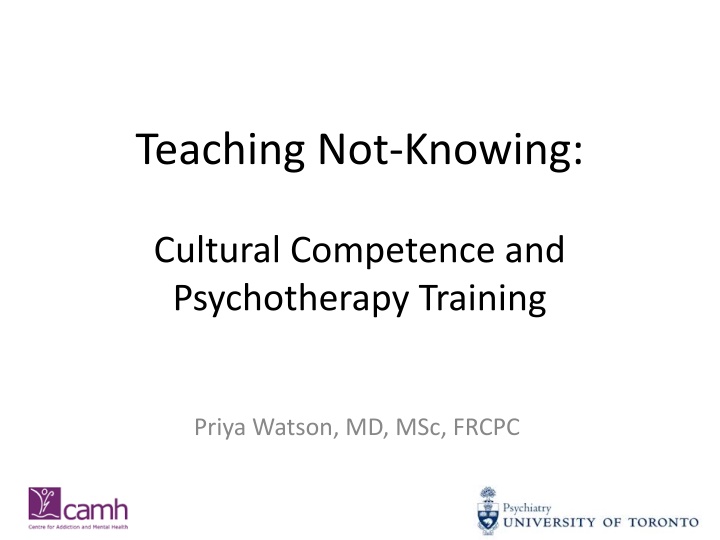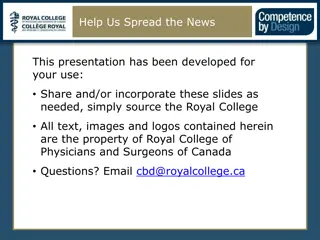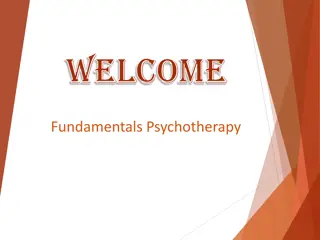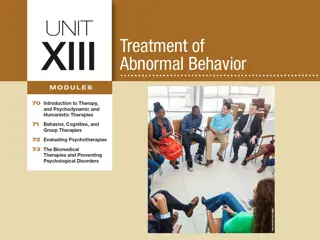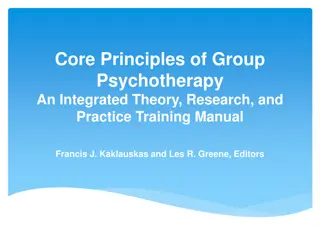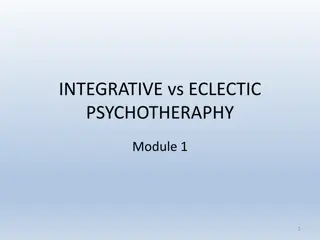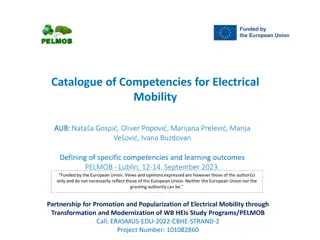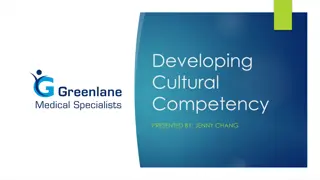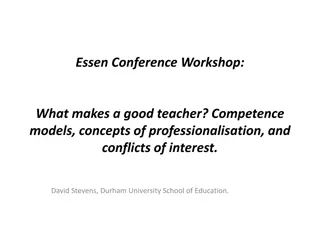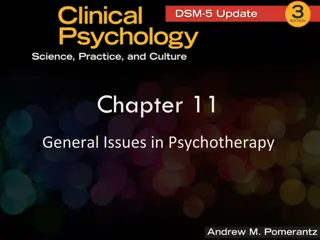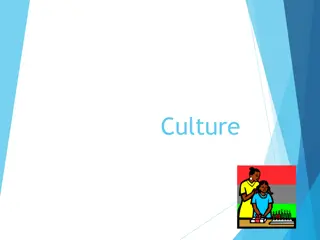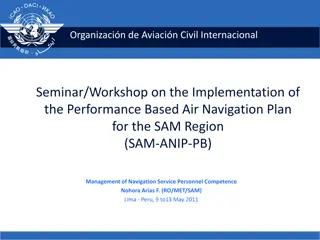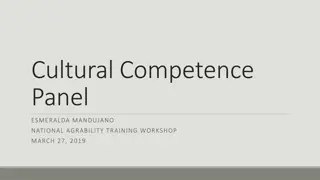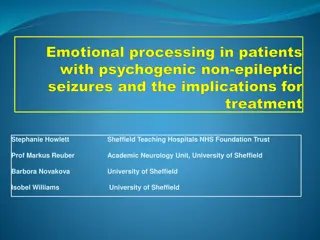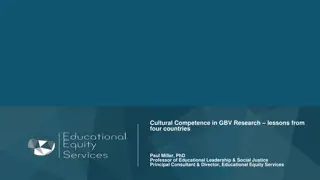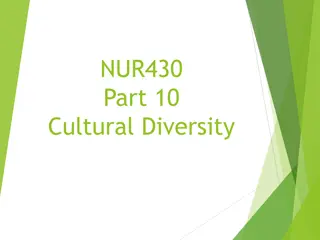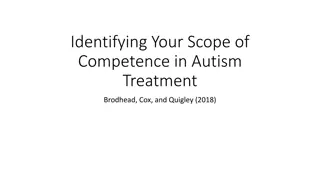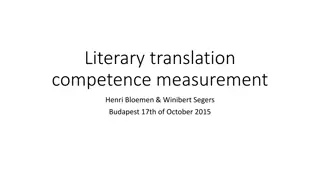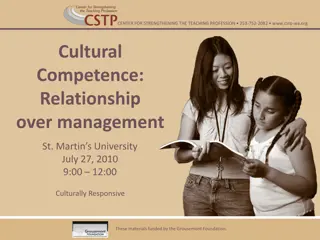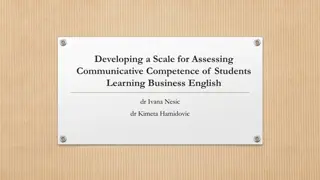Teaching Not-Knowing: Cultural Competence in Psychotherapy Training
Cultural competence in psychotherapy training involves exploring the complexities of culture, understanding the not-knowing stance, and integrating concrete changes in practice. This presentation by Dr. Priya Watson delves into the constructs of culture, the dynamics of cultural interaction, and the flexible nature of knowledge transmission within communities. It emphasizes the importance of transcending cultural boundaries to gain a deeper understanding of different perspectives.
Download Presentation

Please find below an Image/Link to download the presentation.
The content on the website is provided AS IS for your information and personal use only. It may not be sold, licensed, or shared on other websites without obtaining consent from the author.If you encounter any issues during the download, it is possible that the publisher has removed the file from their server.
You are allowed to download the files provided on this website for personal or commercial use, subject to the condition that they are used lawfully. All files are the property of their respective owners.
The content on the website is provided AS IS for your information and personal use only. It may not be sold, licensed, or shared on other websites without obtaining consent from the author.
E N D
Presentation Transcript
Teaching Not-Knowing: Cultural Competence and Psychotherapy Training Priya Watson, MD, MSc, FRCPC
Conflicts of Interest None to disclose P. Watson, University of Toronto 2
Objectives Review constructs of culture and psychotherapy Describe the Not-knowing stance of cultural competence Translate this stance into concrete changes in psychotherapy training practice P. Watson, University of Toronto 3
Whos Here? P. Watson, University of Toronto 4
What is Culture? the beliefs, customs, arts etc of a particular society, group, place or time an integrated pattern of human knowledge, belief, and behavior that depends upon the capacity for learning and transmitting knowledge to succeeding generations -Merriam-Webster Dictionary
What is Culture? Content set of characteristics what Process dynamic interactions how P. Watson and P. Raju, University of Toronto
Kirmayer Culture involves a flexible, ongoing process of transmitting and using knowledge that depends on dynamics both within communities and at the interface between ethnocultural communities and institutions of the larger society, like the health care system, as well as global networks P. Watson, University of Toronto 8
One way to know the culture is to transgress it. -Howard Garfinkel
What are the cultures in play? Therapist- Patient Discipline- Society Therapist- Supervisor Supervisor- Discipline Supervisor- Patient
Cultural Competence Content-Oriented Information acquired by expert Process-Oriented how clinicians ascribe meaning and integrate such meaning in the clinical encounter rather than what therapists know about specific groups. -Lakes, Garro
Explanatory Models A process to elicit understanding within the patient s own cultural references
The Self the Western conception of the person as a bounded, unique dynamic center of awareness, emotion, judgment and action organized into a distinctive whole...is, however incorrigible it may seem to us, a rather peculiar idea within the context of the world s cultures. -Clifford Geertz
Divergence, Instability and the Push for Resolution
Hidden, Invisible, Unexamined P. Watson, University of Toronto 18
Cultural Competence how clinicians ascribe meaning and integrate such meaning in the clinical encounter rather than what therapists know about specific groups Lakes and Garro P. Watson, University of Toronto 19
Cultural Competence Recognition of cultural diversity coupled with analysis of the structural sources of inequality offers us the best way to understand and redress the inequities and injustices that are ignored, or even aggravated, by culturally-blind health care Fraser & Honneth, 2003 P. Watson, University of Toronto 20
Cultural Intersections Patient Trainee Society Discipline Supervisor P. Watson, University of Toronto 21
Cultural Competence Process not Content Iterative, Evolving, Flexible The How of Cultural Competence: The Not Knowing stance P. Watson, University of Toronto 22
The Not-Knowing Stance of Cultural Competence Reflection meta-cognition modeling Reflection Humility critique of the practice itself Humility Mutual Recognition Mutual Recognition inescapable otherness P. Watson, University of Toronto 23
Reflection Meta-cognition Schon: Reflecting In and On Action Themes in the Reflection literature Flexibility Mindfulness Modeling Iteration Link to doing P. Watson, University of Toronto 24
Reflection Involves cultivating habits of mind such as experiencing information as novel, thinking of facts as conditional, seeing situations from multiple perspectives, suspending categorization and judgment, and engaging in self-questioning Epstein 2008 P. Watson, University of Toronto 25
Holding your position lightly Allowing for fundamental uncertainty P. Watson, University of Toronto 26
Humility Self-reflexivity that foregrounds issues of power and legitimacy Questioning the Practice itself Found in literature of Reflective Practice and in literature of Cultural Competence P. Watson, University of Toronto 27
Reflective Practice and Humility The goal of reflection is cultivating habits of mind that allow for informed flexibility, ongoing learning and humility Wald 2009 P. Watson, University of Toronto 28
Cultural Humility Cultural humility is a willingness and ability to listen and learn from patients, but without shying away from the way in which culture and difference are used to stereotype and oppress people or divert attention from various forms of structural violence Kirmayer 2012 P. Watson, University of Toronto 29
Mutual Recognition P. Watson, University of Toronto 30
Mutual Recognition Inescapable otherness of the encounter with a client Exploring the unknown Acknowledging the unknowable Convergence/Resolution vs. Divergence/Disequilibrium 31
The Not-Knowing Stance of Cultural Competence Reflection meta-cognition modeling Reflection Humility critique of the practice itself Humility Mutual Recognition Mutual Recognition inescapable otherness P. Watson, University of Toronto 32
Psychotherapy Supervision For supervisors and trainees, how did you (or how could you): Name and explore your ignorance and hypotheses? [Reflection, Mutual Recognition] Discuss the cultural limits of the psychotherapy paradigms being taught? [Humility, Reflection] Explore the presence of the unknowable aspects of the other for both trainee and client? Talk about otherness and power? [Mutual Recognition, Humility] Protect and promote uncertainty? [Reflection, Humility, Mutual Recognition] 33
Many Selves P. Watson, University of Toronto 34
